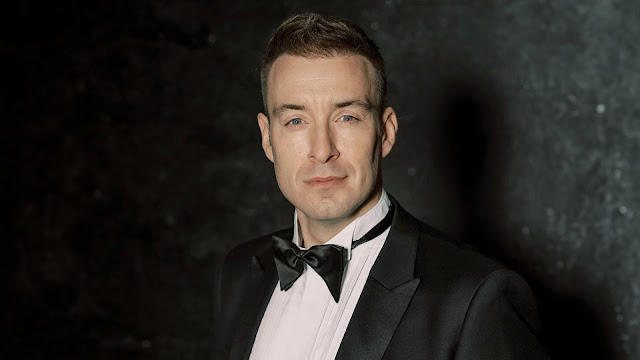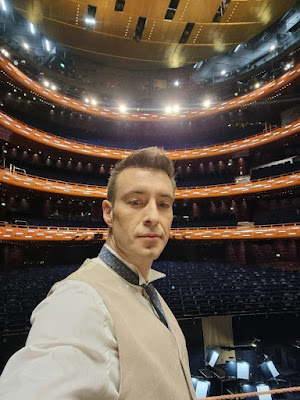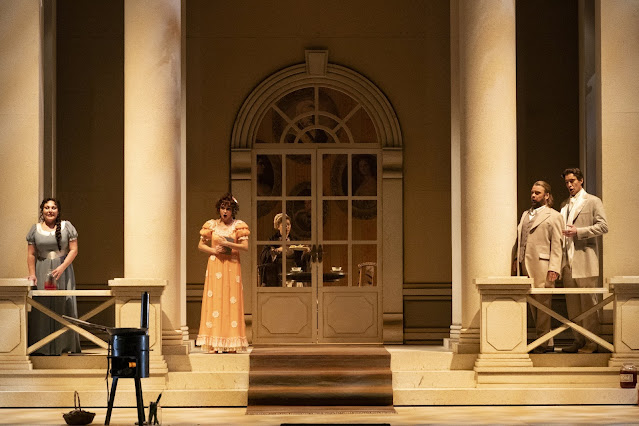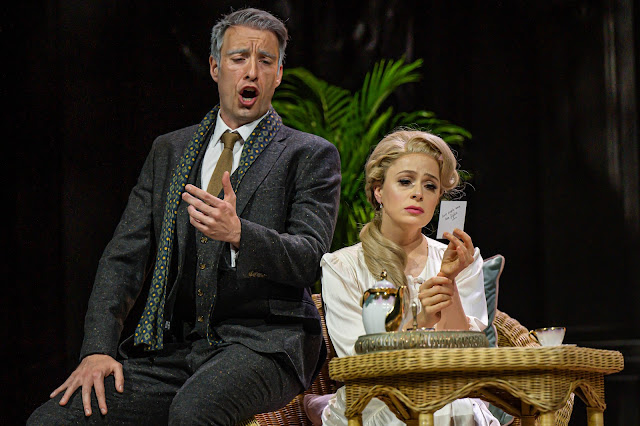 |
| Yuriy Yurchuk |
Baritone Yuriy Yurchuk sings the title role in Northern Ireland Opera‘s new production of Tchaikovsky’s Eugene Onegin which opens on 14 September 2024 at the Grand Opera House, Belfast, directed by Cameron Menzies and conducted by Dominic Limburg, with a cast including Mary McCabe, Carolyn Dobbin, Sarah Richmond, Jenny Bourke and Norman Reinhardt. Yuri performed in the company’s productions of La Boheme in 2021 and La Traviata in 2022, whilst his performances of Eugene Onegin have included the New National Theatre in Tokyo earlier this year, the Royal Danish Opera in Copenhagen and La Monnaie, Brussels in 2023
 |
| Yuriy Yurchuk at Royal Danish Opera |
When Yuri and I spoke, he was in Savolinna in Finland, where he was about to make his role debut in the title role of Mozart’s Don Giovanni. He comments that with the performances taking place in the Medieval castle, entrances and exits involve a lot of running about and negotiating old staircases and uneven dark places. He adds that the quality of the productions at Savolinna is astonishing, and he had nothing but admiration for this year’s new production of Verdi’s Nabucco, directed by Rodula Gaitanou. Don Giovanni is a revival, and Yuriy comments on the way productions can take on lives of their own, within what is a beautiful set the cast can play with the drama, and they have a lot of freedom. This year, Don Giovanni has two casts and the original intention was for them to do the same thing, but each cast has migrated towards doing what the singers feel. He was finding the process exciting, with the Don being a very interesting role.
Yuriy has a far longer acquaintance with Eugene Onegin, having first sung the role in Kyiv in 2016, with subsequent appearances including Tokyo, Copenhagen and Brussels, alongside a Royal Opera House Covent Garden young artists performance. Inevitably, his first performance of the role was very exciting, and he had to work a lot on forming the character and he talks about bridging the gap between you and the character, layering on the acting makeup. With performances in different productions, he finds his work becoming more nuanced. In each new production, he can try different things and feels that his interpretation gets better. He describes opera as an onion, peeling back layers, and adding more detail in the language and the acting.
Regarding Eugene Onegin the opera, he feels it really should be called Tatyana as she is the one whose character has a real arc to it, she is the interesting character. Onegin does not really change much. Yuriy sees the main lesson in the opera as being a study of conflict between people who are relatively close to each other. Onegin is older than Lensky and should know better, but his disregard for conflict, for people’s lives, ends tragically. Yuriy feels that this is the worst part of Onegin’s character, worse than his treatment of Tatyana.
In the final scene, what comes out is Onegin’s egotism, effectively saying I like it so I want it. Yuriy questions whether Onegin really loves Tatyana, and he feels that it is just basic passion, she reminds Onegin of the past, and he sees her as possible redemption. But he puts himself above everything, without thinking about the impact of his actions. And you can argue that he is like this throughout the opera. By the time we come to the final scene, Onegin has travelled abroad, but he has not changed much.
 |
| Tchaikovsky: Eugene Onegin – cast including Yuriy Yurchuk as Onegin – New National Theatre, Tokyo 2024 (Photo: Chikaramaru Hotta) |
The beauty of performing a role in different productions is that you get to discuss it with different directors, try different approaches and examine different aspects of the character. You process all this input from other people, and your performance grows.
But at the end of the day, Yuriy sees the performers as being there to tell a story, whatever the style of production and the director’s take on the work. If the audience sees a radical take on the opera and it makes sense to them and resonates with them, then the performers have done their job. If the director is smart enough to pull out the wild card and the audience understands and feels, then this is a positive result, they are telling the story. For Yuriy, it all comes down to this telling of tales, he has seen some productions that did not make sense but others that were radical yet really resonated. The beauty of Eugene Onegin is that the libretto is sparse so though the dialogue is specific, the possibility for subtext is strong. The cast can treat phrases differently each time, layering them with visual subtext.
Yuriy has mostly performed the opera with non-Russian speaking casts and is usually surprised by the quality of the diction, and he goes on to mention chatting to a tenor during rehearsals on the assumption that the man was Russian based on the way he sang the role. But Yuriy, who is based in the UK, adds that he is now more English-speaking than Russian-speaking.
Looking ahead, after Don Giovanni in Savolinna, he is doing Verdi’s Don Carlo with Opéra de Baugé, though there is a bit of a challenge as there is only a week between one ending and the other beginning. Further ahead, he has Michele in Puccini’s Il Tabarro with Lithuanian National Opera, and then he says ‘We will see’. Regarding other Tchaikovsky roles, he has sung in Iolanta (with the Royal Philharmonic Orchestra, conductor Vasily Petrenko at the Royal Albert Hall and with the Bournemouth Symphony Orchestra this Spring conducted by Kirill Karabits, see the review in Opera Today), which he describes as another beautiful piece to do. On his wish list is Yeletsky, in Tchaikovsky’s Queen of Spades, and he comments that he is looking out for that.
 |
| Verdi: La Traviata – Yuriy Yurchuk, Siobhan Stagg – Northern Ireland Opera, 2024 |
Onegin will be his third role with Northern Ireland Opera, and one of the reasons for returning is to work with Cameron Menzies, who Yuriy describes as pretty amazing, adding that his productions make sense, telling the story well but with an element of surprise. Menzies is also sensitive when it comes to working on the characters. Yuriy likes the environment at Northern Ireland Opera, and enjoys working there. His first opera with them was La Boheme in 2021, just after lockdown and in a church, which was quite an intimate experience and a great privilege to be part of.
Never miss out on future posts by following us
The blog is free, but I’d be delighted if you were to show your appreciation by buying me a coffee.
Elsewhere on this blog
- Relentlessly entertaining: A new production of Handel’s Acis and Galatea at Opera Holland Park rather over-eggs things but features finely engaging soloists – opera review
- Contemporary contrasts: Wolf-Ferrari’s Il segreto di Susanna & Leoncavallo’s Pagliacci in a satisfying double bill at Opera Holland Park – opera review
- A sound world that is distinctive, appealing & engaging: Maria Faust’s Mass of Mary on Estonian Record Productions – record review
- A rich sophistication of thought running through this programme that seems worlds away from the typical debut recital: Awakenings from Laurence Kilsby & Ella O’Neill – record review
- Fine singing and vivid character: a revival of John Cox’s vintage production of Mozart’s Le nozze di Figaro at Garsington – opera review
- An intuitive abstract Sudoku working with sound parameters and with no single solution: Chilean composer Aníbal Vidal on writing music – interview
- Youth, experience and a warm reception: our visit to the Glasperlenspiel Festival in Tartu, Estonia – concert review
- Sustainable Opera for the Future by Max Parfitt of Wild Arts – guest article
- As vivid and vigorous as ever: David McVicar’s production of Handel’s Giulio Cesare returns to Glyndebourne with a terrific young cast – opera review
- Expressionism and rigour: soprano Claire Booth on recording Pierrot Lunaire and the importance of exploring Schoenberg’s songs – interview
- Something of a minor revelation: choral music by Giovanni Bononcini who was brought to England as Handel’s operatic rival – record review
- Home









